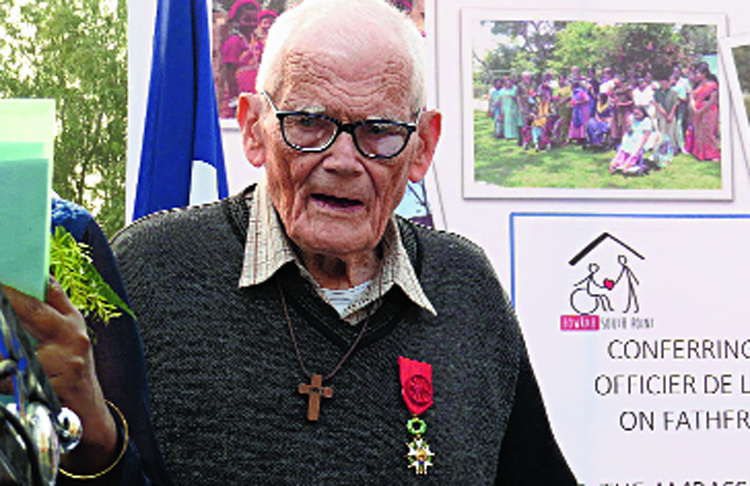For someone just a few days shy of 92, Father Francois Laborde looks amazingly sprightly. His toothless grin comes with a twinkle in his eyes as Father Laborde, who has spent 50 years as a Samaritan in the service of physically, mentally and socially challenged children of Bengal, meets some among the 400-plus kids that various branches of Howrah South Point are home to.
It is this joie de vivre that led the ambassador of France to India, Alexandre Ziegler, to quip during the course of his address on Wednesday: “…You hardly look 17! We will have to check the document.”
The ambassador was at Howrah South Point in Andul to confer the insignia of the Officer of the Legion of Honour on the founding father and moving spirit behind the mission.
His work had earlier inspired Dominique Lapierre’s 1985 book City of Joy.
Much of Laborde’s life was mirrored by the character of Father Stephan Kovalski, the Polish priest who lived and worked in the slums of Calcutta in Lapierre’s book, which was made into a film in 1992 by Roland Joffe.
Ambassador Ziegler described him as “a special man who has a French-sounding name but whose love and dedication to the people of India has justified in his being bestowed with Indian citizenship”. “So, today France is honouring an Indian citizen.” Laborde had already been made a Chevalier of the Legion of Honour in 1988. “Officer” is a higher rank.
Despite Lapierre’s film, the Paris-born man of the cloth, ordained in 1951, has stayed away from the limelight. His self-effacing acceptance speech was all about “collaborations”.
Watching him affectionately were the likes of Haradhan Roy, whom he had found abandoned in Danesh Sheikh Lane nearby. “I have spent all 32 years of my life here. Father is my father and mother,” the wheelchair-bound man later told Metro emotionally after queing up to congratulate him.
Laborde had landed in India in 1965. “I always wanted to come to Calcutta but I was advised to get used to India first by spending time in south India,” Laborde said, settling down for a chat with Metro after seeing off the ambassador. His words can be comprehended by only the practised ears of his associates, but his memory is sharp.
Laborde laughingly calls the nine months that he spent there his “gestation period”, one that prepared him to encounter Calcutta. “It was not an easy time to be here,” he recalled.
With some help, he found a room in a Pilkhana slum to live in. Thus started his mission. “The slum people said they wanted their kids to study. There was no light in the evening. So he got them a room lit by petromax lamp. When they went to the hospital, they needed someone educated to go along to make sense of the goings on. He was there for that,” said Leo Jalais, known to Howrah South Point inmates as “Leo da”.
He found others to help in his mission. “A doctor agreed to visit a dying man in the slum. Father offered him fees. He got angry. They became lifelong friends and he started a dispensary.”
Howrah South Point now runs 10 homes: four in Jalpaiguri, four in Howrah and two in Asansol.
Laborde still wakes up at 6am, visits people and writes a souvenir. A young priest from France, Laurent Bissara, joined the mission six months ago.
“I have finally retired,” Laborde said, at which Jalais insisted that it was just the opposite.
“At every given opportunity to be of service, he jumps the wall,” Jalais said.
“Our work is never over,” Laborde admitted.










